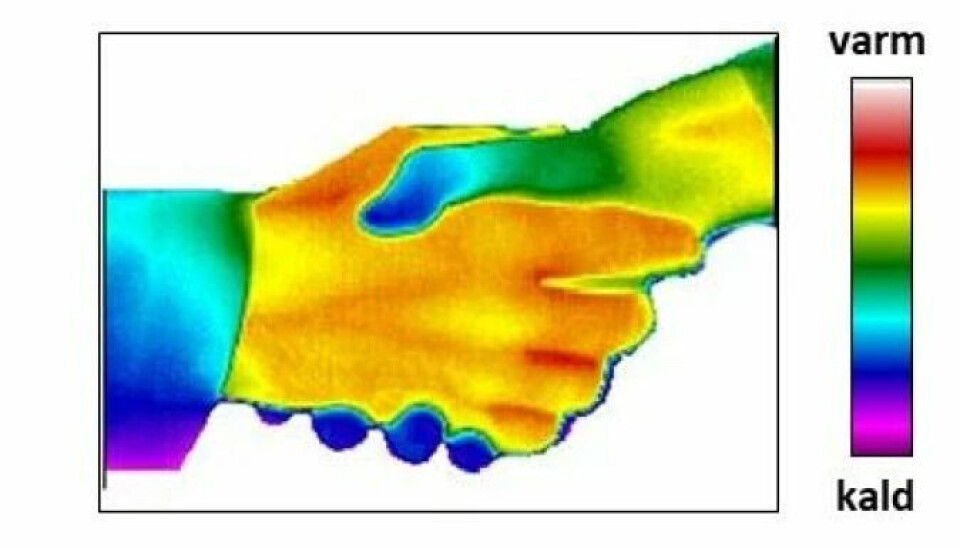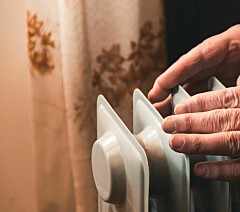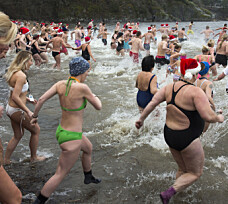
Those who always complain about being cold are actually colder
Some people complain that they are cold even in wool sweaters when others are comfortable in T-shirts. They're not kidding.
Are you one of those people who pulls on a thick sweater and woolly socks as soon as September hits? And do you always carry a woollen scarf in your bag just to be safe, even in the summer?
Turns out you’re not alone.
The Norwegian language has a wonderful expression for such individuals: freezer sticks.
These are people who often say that they feel cold, especially their hands and feet, even when others are warm and comfortable.
James Mercer is a professor emeritus at UiT Norway's Arctic University but is originally from Ireland. He says that the English language has no equivalent expression. Maybe it should.
Because ‘freezer sticks’ are real. They’re not just being whiny. They’re really freezing.
Hands in cold water
People who are always cold can be found in the professor's own research.
In 2018, Mercer and his colleagues published the results from a test of 255 healthy Norwegian army conscripts. The participants took part in a mild cold provocation test, where they had to hold their hands in water at 20°C for one minute. Twenty degrees corresponds roughly to Nordic mid-summer bathing temperatures in the ocean.
The researchers used a thermal camera to measure participants’ hand temperature before the test and for four minutes after their immersion in a water bath.
How quickly the participants warmed up again turned out to vary significantly from person to person.
Some people’s hands did not warm back up
By the end of the water bath, the temperature of participants' hands had dropped by an average of almost seven degrees. For most of them it rose quickly afterwards.
After four minutes, the hand temperature for more than seven out of ten recruits had completely returned to normal. About two out of ten had partially regained the warmth in their hands.
But the hands of the last tenth were still almost as cold four minutes after the test. Among this group of participants, more than the average number had stated beforehand that they always felt colder than other people.
These findings give reason to believe that people who say they’re freezing actually do feel too cold, even if others don’t have the same experience.
Freezer sticks and warm-blooded people
“About ten per cent of the population are freezer sticks, and this group has more women than men,” says Mercer.
At the opposite end of the spectrum, you'll find the warm-blooded folks – the ones who like to wear shorts in snowy weather and who almost always have warm hands.
Not much research has been done on this phenomenon, but studies from Sweden have shown that about a tenth of the population – mostly women – do not tolerate the cold very well.
A study from Iran was published in October, in which the researchers had conducted surveys and interviews in the general population. Here, too, it turned out that just over ten per cent of the participants had poor cold tolerance.

Fingers and feet
Hands and feet are often most affected.
This is natural. When you’re freezing cold, the blood vessels at the outer edges of the body constrict. The temperature in the internal organs is maintained, while less heat is transported out to the extremities – the surface of the skin, arms and legs.
The freezer stick's cold fingers are therefore a good indication that conditions really are cold for them. But why does this group feel cold when others don't?
Muscles and genes
Part of the explanation may simply have to do with size. A small body has a larger surface area relative to its mass compared to a large body. Since we lose heat from our outer surfaces, a small person will tend to get cold more easily.
Muscle mass also matters since muscles produce heat, body heat expert Christopher Minson from the University of Oregon tells the website Upworthy.
A study from 2018 actually showed that the proportion of muscle mass in the body was by far the most important explanation for why a person regained heat quickly after holding their hands in cold water. Body fat and overall size mattered much less.
This finding could perhaps explain why women more often have cold hands than men, as this 1998 study showed.
But there are probably several factors that contribute to determining whether you are a freezer stick or not. A large Korean twin study from 2012, for example, showed that cold hands and feet are hereditary.
Smart adapters
And while we're on the subject of heredity – genetically speaking, it's actually no wonder that some of us have a little trouble with the cold.
“Physiologically, humans are tropical animals,” says Mercer.
“If you’re going to sit buck naked for a few hours, you need to maintain a temperature of almost 30°C so that you won't feel cold.
The only reason we can live outside warm regions on the planet is that we carry around a tropical microclimate between our skin and our clothing,” says the professor.
This is how we adapt to an environment that is actually far too cold for us. And the freezer sticks are perhaps best at adapting, says Mercer.
“They’re good at handling the cold. They know when they’re going to freeze, and they take precautions, like bringing extra socks and sweaters. They’re good at taking care of themselves,” Mercer says.
Reference:
Arne Johan Norheim, James B. Mercer et.al.: Variability in peripheral rewarming after cold stress among 255 healthy Norwegian army conscripts assessed by dynamic infrared thermography. International Journal of Circumpolar Health, 2018.
———
Read the Norwegian version of this article at forskning.no


































